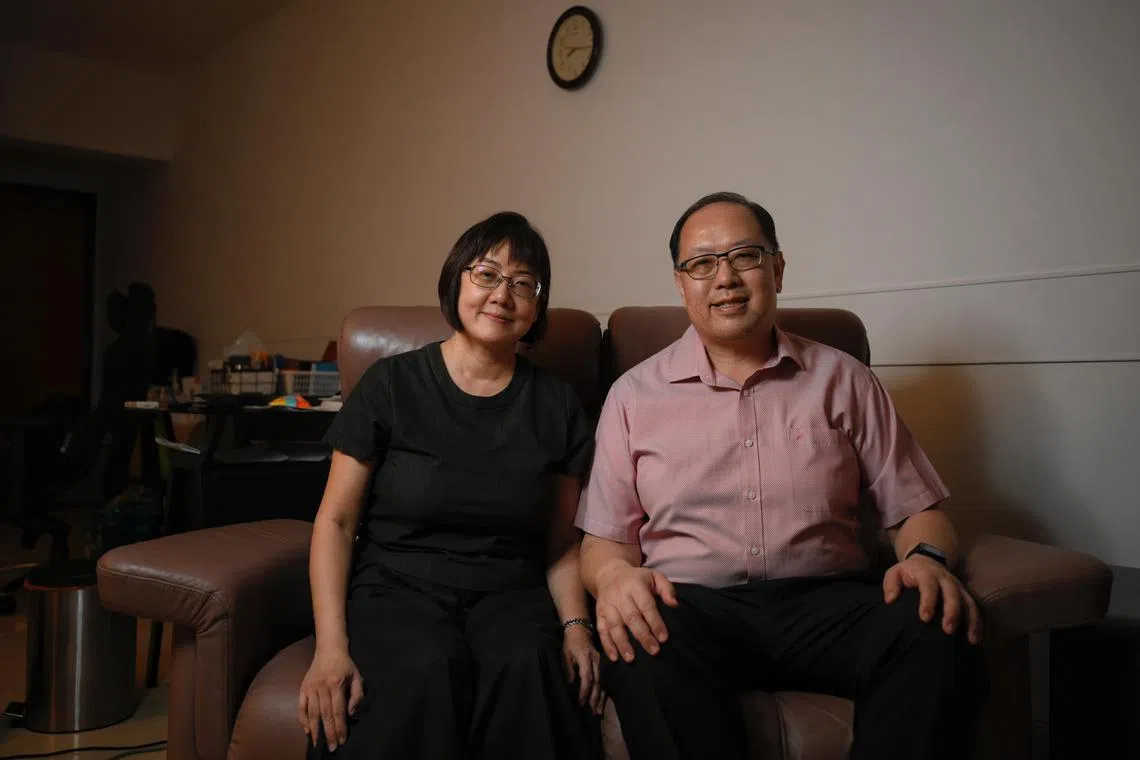Number of foster parents in Singapore more than doubled in the past decade
Sign up now: Get ST's newsletters delivered to your inbox

Mr Sim Kim Leng and Ms Loo Ming Choo have no biological children of their own, but the married couple have been fostering children in need since 2020.
ST PHOTO: MARK CHEONG
SINGAPORE – The number of families providing temporary care to children who have been abused, abandoned or neglected has more than doubled in the past decade, latest figures show.
There were 614 foster families in 2023, up from 243 in 2013.
The number of children placed in foster care grew from 309 in 2013 to 540 in 2023.
These figures were reported in the inaugural Domestic Violence Trends Report released by the Ministry of Social and Family Development (MSF) in September 2024.
The ministry wants to place more of such children in need in foster care and kinship care, which is being under the care of relatives. Both care arrangements are known collectively as family-based care.
This is because children in family-based care showed “better outcomes” in the long run, compared with children who were placed in residential care, such as a children’s home.
In 2023, 66 per cent of children who needed to be looked after outside their own homes were placed in family-based care, up from 41 per cent in 2013.
In a written parliamentary reply on Feb 18, Minister for Social and Family Development Masagos Zulkifli highlighted the efforts by MSF to recruit more foster parents, such as working with various organisations to raise awareness of fostering.
Mr Zhulkarnain Abdul Rahim, an MP for Chua Chu Kang GRC, had asked what the MSF was doing to encourage more people to sign up as foster parents and the challenges preventing them from doing so.
Mr Masagos said: “The MSF seeks to place more children in state care with foster parents as a safe and stable home environment is key to their growth and resilience.”
The ministry has also appointed five fostering agencies to recruit foster parents, train them to care for their foster children and support them in various ways.
In 2022, MSF increased the allowance for foster parents from $936 to $1,100 for a child a month
Foster parents are also eligible for childcare leave to help them balance their caregiving responsibilities, Mr Masagos said.
Despite all these, there are challenges in recruiting more foster parents.
Mr Masagos said: “Common concerns include having sufficient time and resources to meet the needs of a foster child, potential conflicts that may arise between family members and foster children, and the emotional difficulty when children return to their birth families.”
To address these concerns, for example, foster care workers counsel and prepare the foster parents as the time for the child to return to his biological family approaches, and to support them after the child leaves.
Dr Li Dongdong, principal research specialist at the National Council of Social Service, told The Straits Times that an MSF meta-analysis of 23 studies in 2019 found that children cared for by foster parents have better emotional and behavioural outcomes, compared with children living in children’s homes.
These children showed fewer behaviours such as aggression, delinquency and depression, Dr Li said.
She added: “Family-based care allows children to develop bonds with a consistent caregiver who offers individualised and stable care in a safe, home-like environment. Such bonds are crucial for the development of the child’s social, emotional and mental well-being.”
Mr Sim Kim Leng, a 54-year-old sales account manager, and Ms Loo Ming Choo, a 49-year-old finance director, became foster parents in 2020.
The married couple have no biological children, even though they yearned for children and had tried fertility treatment to no avail.
The couple cited their Christian faith in their decision to become foster parents, adding: “We feel there’s a calling to do this work and we have enough love to give them a home and a shelter.”
So far, they have fostered five children for periods of as short as two weeks to about three years for a 16-year-old boy who is still living with them.
The children have also been of different ages, with the youngest being an 18-month-old toddler. To look after the young children who needed 24/7 care, Ms Loo stopped work for a period of time.
She recently rejoined the workforce after the 16-year-old boy finished his N levels. Ms Loo, who coached him, said his studies had improved tremendously.
The fostering journey has been one of ups and downs, the couple said. For example, they spent a lot of time trying to build a relationship with the 16-year-old boy, who kept to himself when he first came to live with them.
And he gave them a big scare once when he did not come home because he wanted to hang out overnight with his friends.
But over time, he warmed up to the Sims and also became more interested in his studies.
Mr Sim said seeing the boy mature and become more responsible gives them joy.
Ms Loo said: “When he first came, his grades were quite bad, but he did very well for his N levels, so it’s all worth it.
“Once, he cooked for me and it was very touching. That was how he showed his love for us.”
Theresa Tan is the senior social affairs correspondent at The Straits Times. She covers issues that affect families, youth and vulnerable groups.



